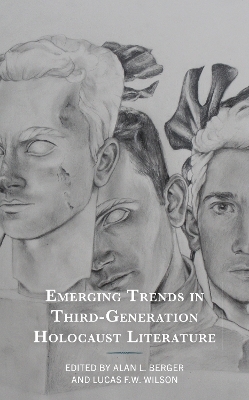
Emerging Trends in Third-Generation Holocaust Literature
Lexington Books/Fortress Academic (Verlag)
978-1-6669-3251-5 (ISBN)
Emerging Trends in Third-Generation Holocaust Literature offers fresh approaches to understanding how grandchildren of Holocaust survivors and perpetrators treat their traumatic legacies. The contributors to this volume present a two-fold perspective: that the past continues to live in the lives of the third-generation and that artistic responses to trauma assume a variety of genres, including film, graphic novels, and literature. This generation is acculturated yet set apart from their peers by virtue of their traumatic inheritance. The chapters raise several key questions: How is it possible to negotiate the difference between what Daniel Mendelson terms proximity and distance? How can the post-memorial generation both be faithful to Holocaust memory and embrace a message of hope? Can this generation play a constructive educational role? And, finally, why should society care? At a time when the lessons and legacies of Auschwitz are either banalized or under assault, the authors in this volume have a message which ideally should serve to morally center those who live after the event.
Alan L. Berger is Raddock Eminent Scholar Chair in Holocaust Studies and director of the Center for the Study of Values and Violence After Auschwitz at Florida Atlantic University. Lucas F.W. Wilson is Justice, Equity, and Transformation Postdoctoral Fellow at University of Calgary.
Chapter 1. Third-Generation Holocaust Inheritance in Two Graphic Narratives: A Layering of Histories and Legacies
Victoria Aarons
Chapter 2. “Things will never be alright again”: Third Generation German Jewish Literature and the Questions of Remembrance, Reconciliation, and Revenge
Luisa Banki
Chapter 3. Julie Orringer’s The Flight Portfolio: A New Turn in Holocaust Representation
Alan L. Berger
Chapter 4. Categories of Catastrophe: Third-Generation Reckoning in Susanne Fritz’s Becoming a Child of War
Katra Byram
Chapter 5. The “Tumor of Memory” in The Origin of Violence
Nathalie Debrauwere-Miller
Chapter 6.: Numbers and Portraits: Reframing Auschwitz Tattoos in Numbered (2012)
Elke Heckner
Chapter 7. Representations of Identity and the Holocaust Archive in Third-Generation Graphic Narrative: Nora Krug’s Belonging: A German Reckons with History and Home
Dana Mihăilescu
Chapter 8. Writing Inherited Stories: A Study of Representational Anxiety in Australian Third-Generation Holocaust Literature
Tess Scholfield-Peters
Chapter 9. Animals and the Holocaust in Nava Semel’s And the Rat Laughed
Naomi Sokoloff
Chapter 10. Third-Generation Holocaust Survivors in Israel: Cultural Narratives
Liat Steir-Livny
Chapter 11. Distant Relations: Third-Generation Perpetrator Descendants Writing in English
Sue Vice
| Erscheinungsdatum | 27.07.2023 |
|---|---|
| Reihe/Serie | Lexington Studies in Jewish Literature |
| Co-Autor | Victoria Aarons, Luisa Banki, Alan L. Berger |
| Sprache | englisch |
| Maße | 159 x 237 mm |
| Gewicht | 526 g |
| Themenwelt | Geschichte ► Allgemeine Geschichte ► 1918 bis 1945 |
| Sozialwissenschaften ► Ethnologie | |
| Sozialwissenschaften ► Soziologie ► Spezielle Soziologien | |
| ISBN-10 | 1-6669-3251-5 / 1666932515 |
| ISBN-13 | 978-1-6669-3251-5 / 9781666932515 |
| Zustand | Neuware |
| Haben Sie eine Frage zum Produkt? |
aus dem Bereich


